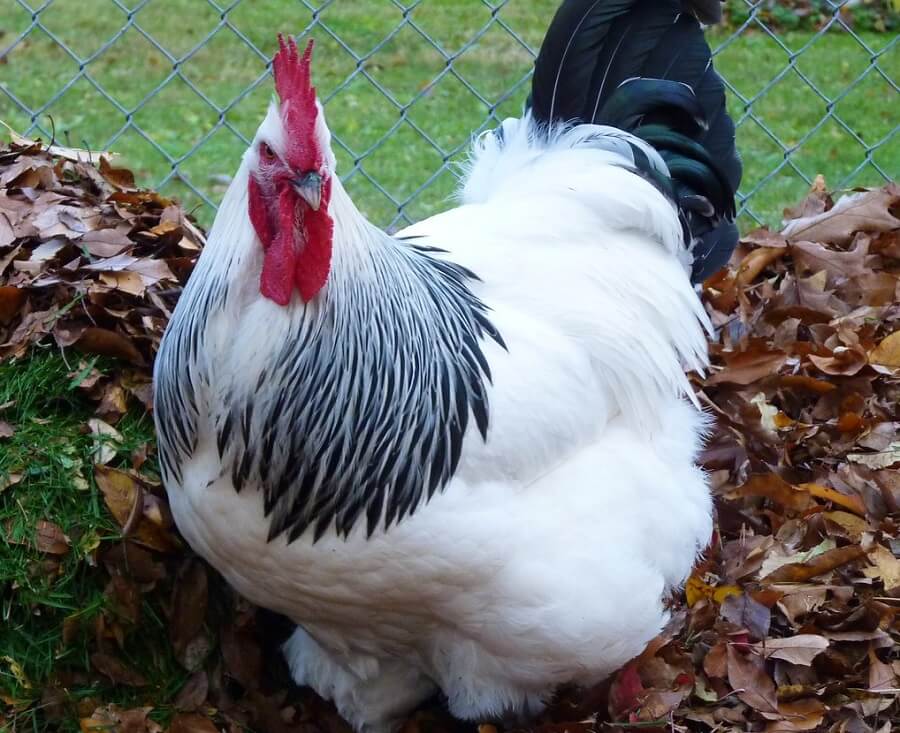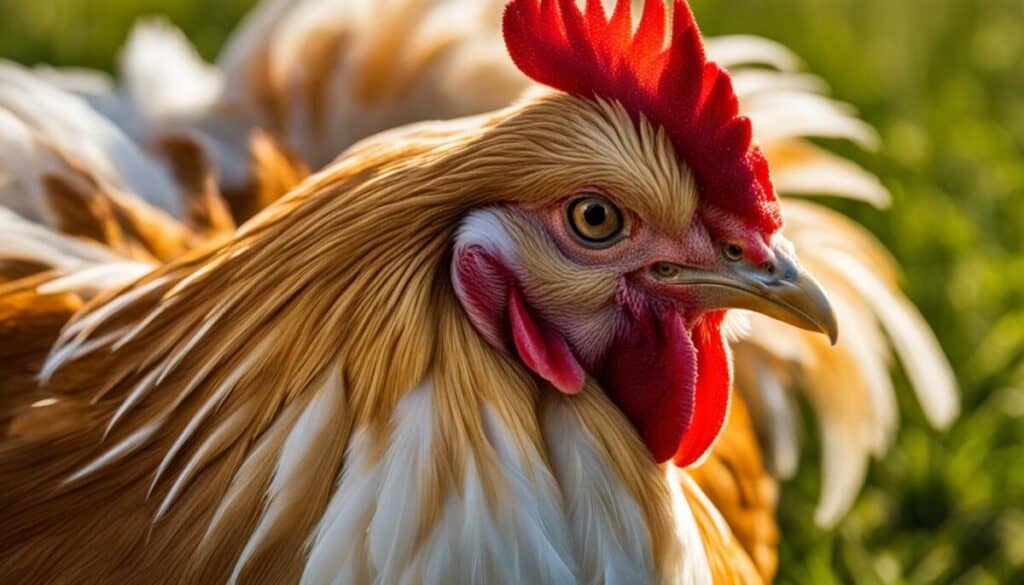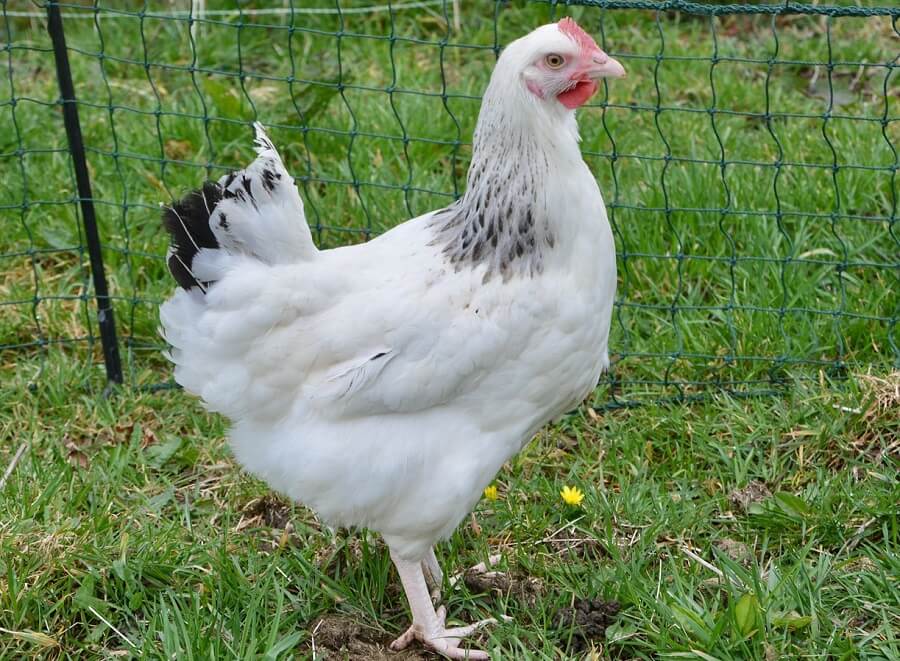If you’re interested in raising chickens, the Sussex breed should be on your radar. These beautiful birds have a lot to offer, from their lovely feather patterns to their reliable egg-laying capabilities.
The Sussex chicken has been around for a couple of hundred years but was almost lost in the early 1900s. It is named for the county in England that it hails from.
Skip Ahead
History of Sussex Chickens
Sussex chickens originated in England around the time of the Roman invasion, in about 43 AD. The original Sussex chickens didn’t look like today’s chickens and are believed to be mostly brown and speckled. They were bred with Roman fowl. Romans introduced the English to poultry as a main table dish.
They were a main staple and one of the popular chicken meats. They were featured in the first poultry show in 1845. However, in the late 1800s, they were popularly bred with other crossbreeds and the meat became tougher and less tasty. By 1903, the original breed was nearly extinct. Most of the breed was contaminated with cross-breeding.
Edward Brown, a noted writer, gave a speech in 1903 that berated Sussex farmers for letting the breed nearly die out. As a result, the breed was revived and brought back from extinction.
The Sussex Chicken’s popularity grew rapidly, and soon, breeders began to develop new varieties of the breed, leading to the creation of Light, Speckled, and Red Sussex.
Over the years, Sussex Chickens became increasingly sought after across the world, and breeders began exporting them to other countries. Today, they remain a popular breed due to their beauty, friendly nature, and exceptional egg-laying ability.
One of the things that sets Sussex Chickens apart from other breeds is their incredible resilience. Despite facing several challenges, including outbreaks of disease and periods of low demand, this breed has managed to endure and remain a beloved choice among poultry keepers.
Sussex Chicken Breeding Clubs
| Club Name | Location | Contact Information |
|---|---|---|
| Sussex Breeders Club | United Kingdom | www.sussexbreedersclub.co.uk |
| American Sussex Breeders Club | United States | www.americansussexbreedersclub.org |
| Australian Sussex Breeders Club | Australia | www.sussexbreeders.com.au |
“As a breed, Sussex Chickens are considered one of the best all-rounders – they’re great for meat, eggs, and exhibition.” – Sussex Breeders Club
Through the efforts of various breeding clubs and associations, Sussex Chickens have received recognition for their many positive qualities and continue to captivate chicken enthusiasts around the world.
Breed Traits of Sussex Chickens

Sussex Chickens are a favorite among backyard chicken keepers and hobbyists alike, thanks in no small part to their unique and varied breed traits. Whether you’re looking for a friendly companion or a reliable layer, Sussex Chickens have plenty to offer. Let’s take a closer look at some of their most notable characteristics:
- Appearance: Sussex Chickens are relatively large birds, with females weighing in at around six pounds and males slightly heavier at around eight pounds. They have a distinctive white coat with black or red markings on their necks, tail feathers, and wings. Their plump and round stature gives them a cute, “teddy-bear” appearance that is hard to resist.
- Temperament: Sussex Chickens have a sweet and docile personality, making them an ideal pet for families with children. They are friendly and enjoy being around people, but are also quite adept at foraging and fending for themselves.
- Hardiness: One of the benefits of raising Sussex Chickens is their resilience to disease and harsh environments. They are adaptable to different climates and can thrive even in colder weather, making them a low-maintenance option for backyard flocks.
- Egg-laying: Sussex Chickens are known for their high egg production rates, with hens laying an average of 250 – 300 eggs per year. Their eggs are large and brown, with a rich flavor and sturdy shell.
- Breeding: Sussex Chickens are a popular breed for breeding due to their large size, hardiness, and excellent egg-laying abilities. They are also highly trainable, making them a great choice for showmanship and exhibition.
Overall, Sussex Chickens are a versatile and charming breed that is well-suited for a wide range of chicken-keeping needs. Their unique appearance, friendly temperament, and reliable egg-laying capabilities make them a popular choice for both novice and experienced poultry keepers.
Reasons To Raise Sussex Chickens
Sussex chickens are traditionally raised for both eggs and meat.
They can be fattened to a rooster weight of 10 lbs (4.5 kgs) and a hen weight of 8 lbs (3.6 kgs). But, hens should be kept to about 7 lbs for better egg-laying abilities. Hens lay about 4-5 large brown eggs a week. That equates to 180-200 eggs a year.
Hens start laying at about 20 weeks. The hens can go broody, but they continue to lay through the cold winter days. The hens are good mothers. Sussex chickens get more colorful with each molt.
Sussex Chicken Physical Features
During the Victorian age, the color was bred into the breed. Now there are light, red, and Speckled Sussex. Unofficial (not recognized by the APA) colors include brown, buff, white, silver, and coronation. Coronation was recreated in 1980 after becoming extinct.
Sussex chickens have a red single comb. They have red wattles and earlobes and white legs. They have 5 toes. The tail is held at a 45-degree angle, which gives them perky look.
Their plumage gets more colorful and lovely with each successive molt. This makes them a fun chicken to watch over the years.
Sussex chickens were accepted into the American Poultry Association in 1914 in the speckled and red varieties. The light-colored variety was recognized in 1929. England also recognizes brown. Other colors exist such as buff, white, silver, and coronation.
Selecting Sussex Chickens: Purebred or Hybrid
Before deciding on which Sussex Chickens to purchase, it’s important to understand the difference between purebred and hybrid birds.
Purebred Sussex Chickens are bred from a line of the same breed, ensuring they retain all the breed characteristics. On the other hand, hybrid Sussex Chickens are a crossbreed of Sussex Chickens with another breed, resulting in birds with varying characteristics.
When it comes to selecting which type of Sussex Chicken to add to your flock, there are pros and cons to both options. Purebred Sussex Chickens are predictable, in terms of their size, appearance, and temperament, making them a popular choice for exhibitions. They’re also easier to breed and maintain the breed traits.
Hybrid Sussex Chickens, on the other hand, are great layers of eggs and can produce up to 280 eggs per year, making them an attractive choice for many poultry enthusiasts.
Additionally, hybrid birds may inherit the favorable traits of both parental breeds, which can be a significant advantage for backyard chicken enthusiasts.
Which Sussex Chicken breeds are available for sale?
| Breed | Temperament | Color | Egg Production | Price Range |
|---|---|---|---|---|
| Light Sussex | Gentle and docile | White with black tails and necks | 220-280 large brown eggs per year | $10-$20 |
| Speckled Sussex | Calm and friendly | White with black or brown speckles throughout the body | 240-260 large brown eggs per year | $10-$30 |
| Red Sussex | Active and friendly | Reddish-brown with black tails and necks | 220-280 large light-brown eggs per year | $15-$25 |
You can find Sussex for sale from reputable breeders. Light Sussex, Speckled Sussex, and Red Sussex are the most common breeds with varying temperaments, colors, and egg-laying abilities.
The price of Sussex Chickens can range from $10 to $30, depending on the popularity of the breed, age, and quality of the bird.
Caring for Sussex Chickens

Proper care is essential to keep Sussex Chickens healthy and happy. As a general rule, chickens require a sustainable environment, a balanced diet, and regular check-ups.
When it comes to housing for Sussex Chickens, providing a secure and spacious coop is crucial. The coop should have nesting boxes, perches, and enough room for chickens to move around comfortably. Additionally, the coop should shelter chickens from harsh weather conditions and protect them from predators.
A balanced diet for Sussex Chickens should consist of high-quality feed and fresh water. Supplementing their diet with fruits, vegetables, and treats is also recommended. However, it’s important not to overfeed chickens as it can lead to obesity and health problems.
Regular health check-ups are necessary to ensure the welfare of Sussex Chickens. Keeping an eye on their feathers, eyes, and beaks can help detect any abnormalities that may require veterinary attention. Additionally, regular cleaning of the coop and run can help prevent the buildup of harmful bacteria and parasites.
Sussex chickens are like their Roman ancestors. They are good foragers but also do well in smaller spaces, such as the crowded Roman streets. They do well in the cold and are somewhat heat tolerant. They are adaptable.
They are not aggressive. Even the roosters have a cheerful disposition. They are friendly, curious and great for beginners because they take little extra care.
Sussex don’t mind being held and do well with children. They are gentle and curious. Sussex chickens are listed in a recovering status by the American Conservancy.
Sussex Chicken Egg Production
Sussex Chickens are not only renowned for their beauty and temperament but also for their excellent egg-laying abilities. They are known to produce large, brown eggs that are deliciously rich and flavorful.
The quality and quantity of eggs Sussex Chickens lay can, however, be influenced by various factors.
Factors such as stress, extreme temperatures, poor nutrition, and disease can all adversely affect Sussex Chicken egg production.
It’s crucial to provide your birds with a clean, well-balanced diet, a comfortable living environment, and regular medical checkups to ensure they are healthy and productive.
One way to maximize your Sussex Chicken’s egg yield is to provide adequate nesting boxes and space for them to lay.
A standard Sussex Chicken can lay up to 250 eggs in a year, making them one of the best egg-laying breeds.
Eggshell Quality
The eggshell quality produced by Sussex Chickens can vary depending on the individual hen’s diet and nutrition. If your chickens have access to a variety of nutrients, their eggshells will be harder with a richer color.
“Sussex Chicken eggs are of excellent quality, with large brown eggs that are full of flavor and nutrients. The rustic, deep brown color of their eggs adds a unique touch to any egg dish!” – Jane Smith, Sussex Chicken breeder.
Finding Reputable Sussex Chicken Breeders
If you’re looking to purchase Sussex Chickens, it’s essential to find a reputable breeder that provides healthy and happy birds. Here are some tips to help you find the right Sussex Chicken breeder:
- Research online: Start by searching for “Sussex Chicken breeders” in your area. Check out various breeder websites and social media pages to learn more about their breeding practices, customer reviews, and available stock.
- Ask around: Reach out to local poultry clubs, farmers markets, and feed stores to inquire about recommended breeders in the area. They might have valuable insights or even know good breeders who aren’t actively advertising online.
- Attend poultry shows: Attending poultry shows is an excellent way to meet breeders, learn more about different chicken breeds, and connect with other chicken enthusiasts. These events often have breeder directories and have Q&A sessions with knowledgeable individuals.
- Ask for references: Once you’ve identified a potential breeder, ask for references from past customers. Contact them to ask about their experience with the breeder, including the health and temperament of their birds and any follow-up support provided.
- Visit the breeder: If possible, schedule a visit to the breeder’s farm to see their facilities and meet their birds in person. This is an opportunity to observe their breeding practices, discuss any concerns, and make an informed decision.
By following these tips, you can safely and confidently purchase Sussex Chickens from reputable breeders who prioritize the health and welfare of their birds.

Frequently Asked Questions about Sussex Chickens
If you’re considering raising Sussex Chickens, you may have some questions about these delightful birds. Here are some of the most frequently asked questions about Sussex Chickens:
What is the lifespan of a Sussex Chicken?
Average lifespan of a Sussex Chicken is around 8 years, but it can vary depending on how well they are cared for.
What color are Sussex Chicken eggs?
Sussex Chickens lay light brown or cream-colored eggs.
Are Sussex Chickens friendly?
Yes, Sussex Chickens are known for their friendly personalities. They’re generally calm and easy to handle, making them a great choice for families with young children.
Can Sussex Chickens be kept with other breeds?
Yes, Sussex Chickens are a docile breed, and they are generally good with other breeds. However, it’s still important to introduce them to other chickens slowly and carefully to ensure they get along.
What are the Sussex Chicken coop requirements?
Sussex Chickens require a coop that is secure, dry, and well-ventilated. The coop should be large enough to allow the chickens to move around freely, with a roosting area and nest boxes for egg-laying.
“Sussex Chickens are a joy to keep, and their friendly personalities and delicious eggs make them a popular choice among chicken enthusiasts!”
Hopefully, these answers to frequently asked questions about Sussex Chickens have helped you in your quest for more information about these wonderful birds.
Conclusion
In conclusion, Sussex Chickens are an excellent addition to any flock due to their unique breed traits, ease of care, and exceptional egg production capabilities. Whether you are a novice or experienced poultry keeper, it’s essential to understand their history and characteristics to appreciate them fully.
When selecting Sussex Chickens for your flock, consider whether you prefer purebred or hybrid birds and ensure you purchase them from reputable Sussex Chicken breeders.
To provide proper care for your Sussex Chickens, ensure they have adequate housing and nutrition, and follow general best practices for keeping them healthy and happy.
Whether you’re looking to add Sussex Chickens to your flock or expand your knowledge of poultry breeds, we hope this comprehensive guide has provided useful information on Sussex Chickens’ characteristics, egg production capabilities, and care requirements.
Thank you for reading, and we wish you the best of luck in your journey with Sussex Chickens.
FAQ
Can Sussex Chickens be kept with other chicken breeds?
Yes, Sussex Chickens generally get along well with other chicken breeds and can be integrated into mixed flocks. However, it’s essential to provide adequate space and monitor their interactions to ensure a harmonious environment.
How long do Sussex Chickens live?
With proper care, Sussex Chickens can live for 6 to 8 years on average. Some individuals have been known to live even longer with exceptional care and a healthy lifestyle.
What color are Sussex Chicken eggs?
Sussex Chickens lay brown eggs. The exact shade can vary between light brown and dark brown, with some variations in speckling or freckling patterns on the shells.
How many eggs do Sussex Chickens lay per week?
On average, a healthy Sussex Chicken can lay approximately 4 to 5 eggs per week. However, this can be influenced by factors such as nutrition, age, and seasonality.
Do Sussex Chickens require any special care during winter?
Sussex Chickens are hardy birds and can tolerate cold temperatures well. However, it’s important to provide them with a draft-free coop and sufficient bedding to help them stay warm. Additionally, ensuring access to fresh water and adjusting their diet can help support their well-being during winter.
What are the minimum coop requirements for Sussex Chickens?
Sussex Chickens require at least 4 square feet of coop space per bird, along with an outdoor run or free-range access. The coop should be well-ventilated, predator-proof, and provide roosting and nesting areas for the chickens’ comfort.
Can Sussex Chickens be raised for meat?
While Sussex Chickens are primarily known for their egg-laying abilities, they can also be raised for meat. Their meat is flavorful and succulent, making them a versatile breed for both egg and meat production.

